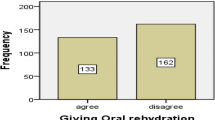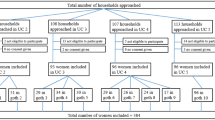Abstract
Objective : To determine diarrhea management in rural practitioners.Methods : This study was conducted among the RMP’s of 4 blocks of Aligarh. Pre-coded questionnaire was completed and educational programme followed. 91 % were prescribing ORS in various combinations, but only 9.8% were advising ORS and feeding as standard management of diarrhea. Only 12.8% could name a WHO ORS brand and 50% were giving wrong instructions for preparation. 95% were advising inadequate amounts of ORS. Only 43.5% were advising feeding during diarrhea but 86.6% were advising to continue breastfeeding. On an average every 3rd to 4th patient was administered IVF’s. 52% felt that drugs should be prescribed.Results : 90% and 55.3% of RMPs could identify diarrhea and key signs of dehydration.Conclusion : There is a need for hands on training for the practitioners and education of the masses regarding proper management of diarrhea.
Similar content being viewed by others
References
International Institute. for Population Sciences 1995. National: Family Health Survey (MCH and Family Planning), India 1992–93.
Ibrahim S, Israni Z. Evaluation of doctors trained at Diarrhea Training Unit of National Institute of Child Healt, Karachi,J Park Med Assoc 1997; 47(1): 7–11.
Kumar V, Kumar R, Khurana JL. Assessment of the effect of training on management of acute diarrhea in a primary health care setting.J Diarrheal Dis Res 1989; 7(3–4): 70–76.
Baig LA, Thaver I. Does training affect quality of diarrhea case management,J Park Med Assoc 1997; 47(8): 294–207.
Reis EC, Goepp JG, Katz S, Santosham M. Barriers to use of oral rehydration therapy.Pediatrics 1994; 93(6): 708–711.
Dua T, Bahl R, Bhan MK, Lessons learnt from Diarrheal Disease Control Program and Impiications for the Future.Indian J Pediatr 1999; 66: 55–61.
Raghu MB, Balasubramnian S, Indumathy, Balsubraminyam G. Awareness of and attitude towards oral rehydration therapy.Indian J Pediatr 1995; 62(4): 439–443.
Prajapati NC, Choudhry P, Sachdev HP, Dubey AP, Puri RK. Commercial and oral rehydration solutions — Pitfalls, knowledge, attitude and practices.Indian Pediatr 1992; 29(11): 1391–1403.
Chowdhry AM, Karim F, Sarkar SK, Cash RA, Bhuiya. The status of ORT (Oral Rehydration Therapy) in Bangladesh: how widely is it used?A Health Policy Plan 1997; 12(1): 58–66.
Author information
Authors and Affiliations
Corresponding author
Rights and permissions
About this article
Cite this article
Alam, S., Khan, Z. & Amir, A. Knowledge of diarrhea management among rural practitioners. Indian J Pediatr 70, 217–219 (2003). https://doi.org/10.1007/BF02725587
Issue Date:
DOI: https://doi.org/10.1007/BF02725587




